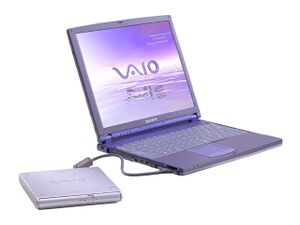PCG-Z: Difference between revisions
More actions
Romanio0089 (talk | contribs) mNo edit summary |
|||
| Line 23: | Line 23: | ||
'''MSRP:''' ~$2000 (Unconfirmed) | '''MSRP:''' ~$2000 (Unconfirmed) | ||
==Daily Usage Today== | ==Daily Usage Today== | ||
This laptop is | This laptop is unusable today apart from some office tasks like Word, Excel, PowerPoint and some more. Don't expect late 90s-2000s games to run on the laptop, at least at high settings, these are better suited for MS-DOS gaming due to the low power graphics chip. They will not run any OS beyond Windows 7, due to the missing PAE-NX support on the Pentium III, and even Windows 7 will run very poorly on this hardware. | ||
==Resources== | ==Resources== | ||
Revision as of 18:11, 9 February 2024
This page is currently WIP!!
Overview


The Sony VAIO PCG-Z505 or PCG-Z600 was a subnotebook released by Sony in April of 1999. It looks like Sony made a sort of design refresh of the PCG-505/N505 with a slimmer, rectangular battery compared to the round battery found in the previous models. The bezels were also slimmed down compared to the already slim bezels of the N505. Other than that the laptop is pretty similar compared to the N505. Sony was really showing off their skills of miniaturisation in the 505 line, making laptops so thin and stylish that people would walk into Sony shops just to gaze at them. On the right side, a jog dial was added.

Detailed Specs
Processor: Pentium II 333MHz, Pentium III 650-800MHz, Celeron 500-600MHz
Graphics: ATI RAGE Mobility-M1 or NeoMagic MagicMedia256XL+(NM2380)
Chipset: Intel 440ZX AGPset 100MHz
Memory: Standard 64MB - Maximum 192MB
Display: 12.1" TFT color, XGA, 1024 x 768
Storage: 6.4GB - 15GB IDE HDD
Weight: 1.7kg
MSRP: ~$2000 (Unconfirmed)
Daily Usage Today
This laptop is unusable today apart from some office tasks like Word, Excel, PowerPoint and some more. Don't expect late 90s-2000s games to run on the laptop, at least at high settings, these are better suited for MS-DOS gaming due to the low power graphics chip. They will not run any OS beyond Windows 7, due to the missing PAE-NX support on the Pentium III, and even Windows 7 will run very poorly on this hardware.
